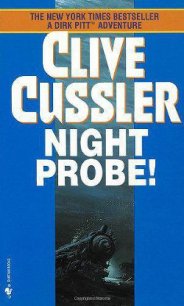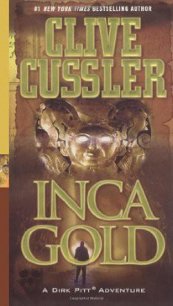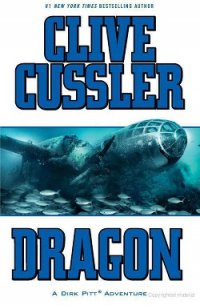Raise the Titanic - Cussler Clive (книги читать бесплатно без регистрации полные .txt) 📗
"Very cunning," Marganin said, staring at the newspaper. "Anything else?"
"This is good-by," the fat man murmured.
"Good-by?"
"Yes. I have been your contact long enough. Too long. We've come too far, you and I, to become lax in our security now."
"And my new contact?"
"Are you still living in the naval barracks?" the fat man replied with another question.
"The barracks will remain my home. I am not about to draw suspicion as a big spender and live in a fancy apartment like Prevlov's. I shall continue to lead a spartan existence on my Soviet naval pay."
"Good. My replacement is already assigned. He will be the orderly who cleans the officers' quarters of your barracks."
"I will miss you, old friend," Marganin said slowly.
"And I, you."
There was a long moment of silence. And then, finally, the fat man spoke again in a hushed undertone. "God bless, Harry."
When Marganin folded the newspaper and laid it aside, the fat man was gone.
82
"That's our destination over there to the right," the pilot of the helicopter said. "I'll set down in that pasture just across the road from the churchyard."
Sandecker looked out the window. It was a gray, overcast morning and soft blankets of mist were hovering over the low areas of the tiny village. A quiet lane wandered past several quaint houses and was bordered on both sides by picturesque rock walls. He stiffened as the pilot made a steep bank around the church steeple.
He glanced at Donner on the seat beside him. Donner was staring straight ahead. In front of him, occupying the seat next to the pilot, was Sid Koplin. The mineralogist had been called back on this one last assignment for Meta Section, because Herb Lusky was still not well enough to make the trip.
Sandecker felt the slight bump as the landing skids touched the ground, and a moment later the pilot cut the engine and the rotor blades drifted to a stop.
In the sudden stillness after the flight from London, the pilot's voice seemed overly loud. "We're here, sir."
Sandecker nodded and stepped out the side door. Pitt was waiting and walked toward him with an outstretched hand.
"Welcome to Southby, Admiral," he said smiling.
Sandecker smiled as he took Pitt's hand, but there was no humor in his face. "The next time you take a powder without notifying me as to your intentions, you're fired."
Pitt feigned a hurt expression and then turned and greeted Donner. "Mel, nice to see you."
"Likewise," Donner said warmly. "I believe you've already met Sid Koplin."
"A chance meeting," Pitt grinned. "We were never formally introduced."
Koplin took Pitt's hand in both of his. This was hardly the same man Pitt had found dying in the snows of Novaya Zemlya. Koplin's grip was firm and his eyes alert.
"It was my fondest wish," he said, his voice heavy with emotion, "that some day I would have the opportunity of thanking you in person for saving my life."
"I'm glad to see you in good health," was all Pitt could think of to mumble. He looked down at the ground nervously.
By God, Sandecker thought to himself, the man was actually embarrassed. He never dreamed he'd see the day when Dirk Pitt turned modest. The admiral rescued Pitt by grabbing him by the arm and pulling him toward the village church.
"I hope you know what you're doing," Sandecker said. "The British frown upon colonials who go around digging up their graveyards."
"It took a direct call from the President to the Prime Minister to cut through all the bureaucratic red tape of an exhumation," Donner added.
"I think you will find the inconvenience has been worth it," Pitt said.
They came to the road and crossed it. Then they passed through an ancient wrought-iron gate and walked into the graveyard that surrounded the parish church. They walked in silence for several moments, reading the inscriptions on the weather-worn headstones.
Then Sandecker motioned toward the little village. "It's so far off the beaten track. What steered you onto it?"
"Pure luck," Pitt answered. "When I began tracing the Coloradans' movements from Aberdeen, I had no idea of how Southby might fit in the puzzle. The final sentence in Brewster's journal, if you recall, said 'How I long to return to Southby.' And, according to Commodore Bigalow, Brewster's last words just before he shut himself in the Titanic's vault were 'Thank God for Southby.'
"My only inkling, and a meager one at that, was Southby had an English ring to it, so I began by pinpointing as nearly is I could the miners' trail to Southampton-"
"By following their grave markers," Donner finished.
"They read like signposts," Pitt admitted. "That and the fact that Brewster's journal recorded the times and places of their deaths, except, that is, for Alvin Coulter and Vernon Hall. Coulter's final resting place remains a mystery, but Hall lies here in the Southby village cemetery."
"Then you found it on a map."
"No, the village is so small it isn't even a dot in the Michelin Tour Guide. I just happened to notice an old, forgotten hand-painted sign some farmer had set along the main road years ago advertising a milk cow for sale. The directions gave the farm's location as three kilometers east in the next country lane to Southby. The last pieces of the puzzle then began dropping into place."
They walked along in silence and made their way over to where three men were standing. Two wore the standard work clothes of local farmers, the third was in the uniform of a county constable. Pitt made the brief introductions, and then Donner solemnly handed the constable the order for exhumation.
They all stared down at the grave. The tombstone stood at one end of a large stone slab that lay atop the deceased. The stone simply read:
VERNON HALL
Died April 8, 1912
R.I.P.
Neatly carved in the center of the arched horizontal slab was the image of an old three-wasted sailing ship.
"'. . . the precious ore we labored so desperately to rape from the bowels of that cursed mountain lies safely in the vault of the ship. Only Vernon will be left to tell the tale, for I depart on the great White Star steamer . . . '" Pitt recited the words from Joshua Hays Brewster's journal.
"Vernon Hall's burial vault," Donner said as if in a dream. "This is what he meant, not the vault of the Titanic."
"It's unreal," Sandecker murmured. "Is it possible that the byzanium lies here?"
"We'll know in a few minutes," Pitt said. He nodded to the two farmers who began shoving at the slab with pry bars. Once the slab was hefted aside, the farmers began digging.
"But why bury the byzanium here?" Sandecker asked. "Why didn't Brewster go on to Southampton and have it loaded on board the Titanic?"
"A myriad of reasons," Pitt said, his voice unnaturally loud in the quiet graveyard. "Hunted like a dog, exhausted beyond human endurance, his friends all brutally murdered before his eyes, Brewster was pushed into madness just as surely as Gene Seagram was when he learned that fate had snatched away his moment of success on the very verge of fulfillment. Add all that to the fact that Brewster was in a strange land; he was alone and friendless. Death stalked him constantly without letup, and his only chance for escaping to the United States with the byzanium was moored several miles away at the dock in Southampton.




